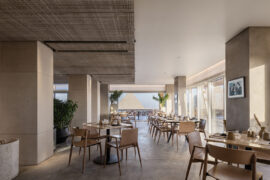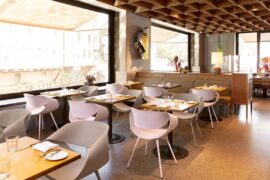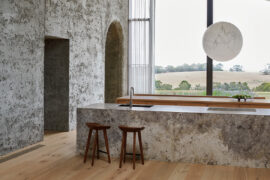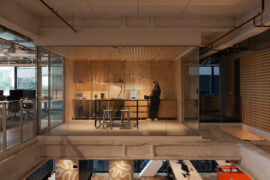At the DBS Academy, holistic design solutions have been introduced to redefine the act of learning. Olha Romaniuk writes.

May 4th, 2016
Photography by Tan Jingyi
Immediately upon stepping into any of the DBS Academy’s training or meeting spaces, it becomes evident that the learning centre is not your standard corporate training facility. The Academy, with its focus on building a strong talent pool capable of adapting to the fast pace of the banking industry, reflects DBS’ pledge to employee development through specifically designed training and education spaces that encourage innovation.
“In the past, training was conducted in a classroom setting where the facilitator just relayed knowledge to the audience. Nowadays, it is no longer just about learning from the trainer but about learning from each other, working with people from different backgrounds, and understanding how other people think as we go into this new digital world,” explains Frances Chan, Senior Vice President, Group Human Resources – Learning & Development, DBS Bank.
With DBS’ evolving requirements for training facilities and ambitious vision for the future, the need for the new training facilities to be able to keep up and anticipate the current and future needs of the bank materialised as one of the main goals. The resulting design of the DBS Academy was a product of a combined effort between the design team at Aplusi Asia and workplace strategist MCM Architecture of London to develop a brief that tackled all of the goals set forth by DBS. From these goals, some key guidelines for design of the new space emerged, including the aim to establish for DBS a global reputation for excellent corporate learning, provision of a memorable experience for every user and visitor, delivery of training in a fun and joyful way, and development of flexible training and event spaces.
Philip Jacobs, Managing Director of Aplusi Asia, recalls, “The first phase [of the design process] was a global research project to identify cutting-edge learning institutions across all sectors. The output drove a series of Human Centred Design workshops with the Regional Leadership team and the Corporate Real Estate Team to identify project aspirations and key drivers for the building and to confirm project direction as design concepts developed.”
According to Jacobs, the resulting research affirmed a continuing necessity to deliver traditional classroom style training and a need for new learning environments for leadership training and flexible and interactive spaces for collaboration. Other spaces identified during the research were flexible workspaces to support administrative functions and training activities, and an event “heart” to allow large town hall meetings for customers, collaborators and the DBS staff.
As compared to DBS’ previous, 20,000 square foot conventionally designed training centre, the new DBS Academy was realised as a 40,000 square foot, four-storey facility containing formal and informal meeting and training spaces. The topmost fourth floor became the most flexible, with moveable walls and retractable partitions allowing for a complete freedom of layout configurations and room size variations, while the third floor selectively employed a mix of fixed components – walls, glass partitions – and moveable furniture elements to create more defined meeting spaces that could still be reconfigured according to varying needs. With the second floor featuring a more traditional layout with many small rooms for coaching and smaller group discussions, the design of the first floor gave way to “The Curve” – a multifunctional common space used for talks, presentations and town-hall meetings.
The design aesthetics of the interior spaces at DBS Academy emerged from a desire to create the antithesis to the typical expressions of a corporate classroom. During brainstorming sessions, the team zoomed in on words like ‘urban’, ‘edgy’ and ‘cool’ – terms not typically associated with the banking industry – to generate the look and feel and the overall material palette for the spaces within the academy.
Says Jacobs, “We looked to materials that expressed a raw natural aesthetic and that were not normally found within a corporate environment. We also looked to continue the design down to the smallest details, such as the indicator lights for the rooms and the wooden crate recycling bins.”
With a variety of imaginative architectural solutions for flexible and adaptable spaces, the DBS Academy aims to deliver a new kind of learning and training environment that challenges the rigid notions of traditional training facilities – something that Philip Jacobs and his team strived for all along the design process. Jacobs concludes, “We are aiming to deliver an environment that nurtures the inspiration to be a disruptor, to search for the out of the box solution.”
Aplusi Asia
aplusiasia.com
MCM Architecture
mcm-uk.com
INDESIGN is on instagram
Follow @indesignlive
A searchable and comprehensive guide for specifying leading products and their suppliers
Keep up to date with the latest and greatest from our industry BFF's!
The new range features slabs with warm, earthy palettes that lend a sense of organic luxury to every space.
The internet never sleeps! Here's the stuff you might have missed

Pedrali’s Nemea collection, designed by Cazzaniga Mandelli Pagliarulo, marks 10 years of refined presence in hospitality and commercial spaces around the world. With its sculptural timber form and enduring versatility, Nemea proves that timeless design is never out of place.

We think of the chair as a ubiquitous object but every now and then there is a design that ticks all the boxes and makes its presence felt on the global stage.

The INDE.Awards 2025 has named House on a Hill by Leeton Pointon Architects and Allison Pye Interiors as the winner of The Interior Space category, presented by Tongue & Groove. This multigenerational country home on Bunurong Country redefines residential architecture and design with its poetic balance of form, function, and sanctuary.

The Arup Workplace in Perth/Boorloo, designed by Hames Sharley with Arup and Peter Farmer Designs, has been awarded The Work Space at the INDE.Awards 2025. Recognised for its regenerative design, cultural authenticity, and commitment to sustainability, the project sets a new benchmark for workplace architecture in the Indo–Pacific region.